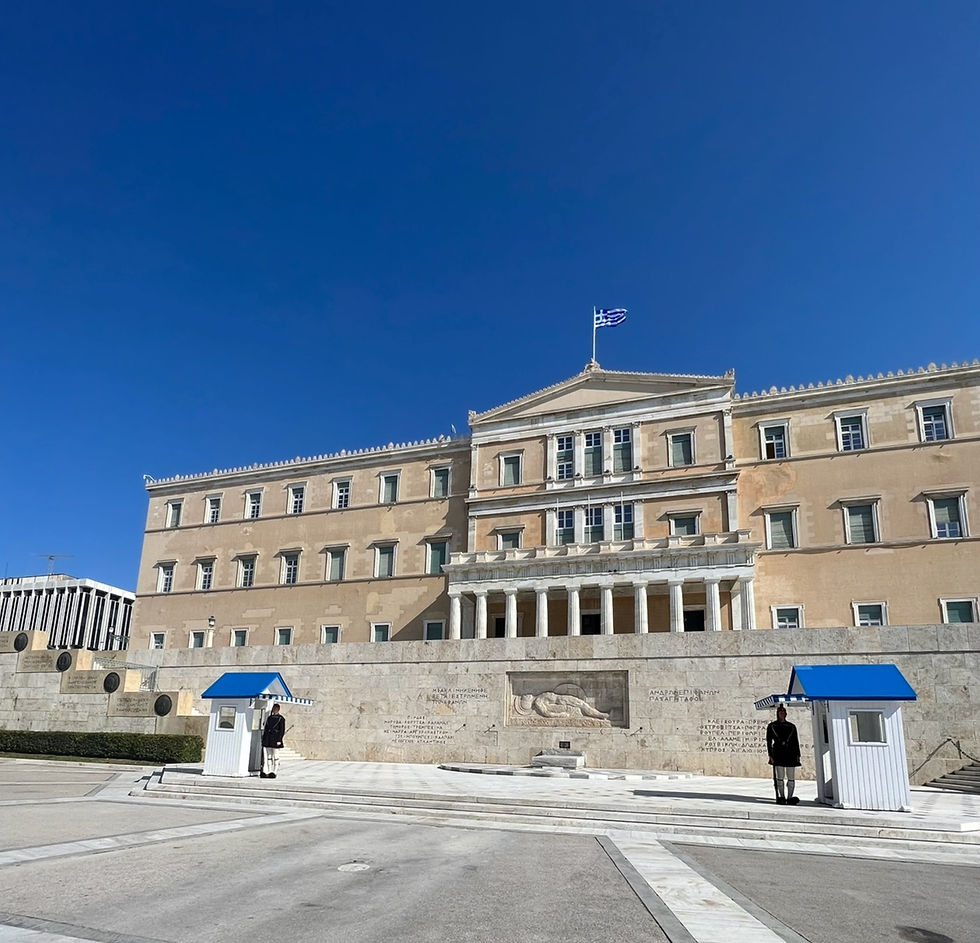Exploring the Changing of the Guard at Syntagma Square in Athens
- Georgia Louise

- Jun 11, 2025
- 4 min read
Updated: Jun 12, 2025

Syntagma Square, situated in the heart of Athens, is not just a bustling hub for both locals and tourists; it is also the site of one of Greece's most cherished traditions—the Changing of the Guard ceremony. Each hour, on the hour, the guards donning their signature uniforms perform a riveting ritual that attracts crowds from across the globe. This post explores the rich history, meaning, and stunning display of the Changing of the Guard at Syntagma Square.
Historical Importance
The Changing of the Guard has its roots in the establishment of the modern Greek state in the 19th century. The Evzones, or "chosen ones," as they are affectionately called, belong to the Presidential Guard. They are elite soldiers dedicated to safeguarding the Tomb of the Unknown Soldier, located in front of the Greek Parliament building in Syntagma Square.
This tradition is steeped in historical importance and pays homage to the bravery and sacrifice of the Greek fighters during the War of Independence. The Evzones' distinctive uniforms reflect the resilience of these fighters. As living symbols of Greece's cultural heritage, the guards serve as a source of national pride, reminding citizens and visitors alike of their shared history.
The Uniforms
The uniforms worn by the Evzones are not only eye-catching but also rich in symbolism. The most recognizable outfit features a white fustanella (a pleated skirt), a blue sash, a shirt, and hand-knitted stockings, topped by a ceremonial cap known as a fez. Each component is meaningful, signifying elements of Greece's past.
For instance, the white fustanella celebrates the attire worn by Greek fighters during the War of Independence, while the red and black tassels symbolize the blood shed in their struggle for freedom. The Evzones also wear distinctive black shoes with a pom-pom at the toe, known as "tsarouchia." These shoes are a striking representation of Greek folk attire and are designed to make a sound when the guards march, adding to the ceremony's dramatic flair.
Ceremony Details
Visitors can witness the Changing of the Guard ceremony hourly, but the most extravagant event unfolds on Sundays at 11 a.m. During this special ceremony, the guards parade in full regalia, showcasing elaborate choreography. The ceremony kicks off with a synchronized march and a series of carefully timed movements.
The atmosphere during the ceremony is electric, with crowds of locals and tourists capturing this moment on their cameras. The precision and discipline shown by the Evzones are remarkable, creating a fusion of historical reverence and contemporary allure. In fact, over 2 million tourists visit Syntagma Square annually, making it one of Athens' top attractions.
The Experience
Watching the Changing of the Guard at Syntagma Square is more than just a visual treat; it fosters a deep connection to Greek history and culture. The guards stand stoically for hours, embodying strength and pride. Visitors are encouraged to take pictures and admire the beauty of the ceremony while also respecting the solemn nature of the occasion.
As the guards execute their routine, the rhythmic clacking of their footwear on the marble surface blends harmoniously with the historical backdrop of the Parliament building. This immersive experience transports observers back in time, creating an unforgettable moment steeped in culture.
Tips for Visitors
If you're planning to experience the Changing of the Guard, here are some practical suggestions:
Timing: Arrive early, especially on Sundays, as the ceremony draws large crowds. Finding a good spot will ensure you have a superb view of the guards.
Respect the Ceremony: Remember, this tradition is important to the Greek people. Keep noise to a minimum and avoid disruptive behaviour. Also it is important to note that at the end of the ceremony it is not customry to clap. despite gaining popularity with tourists over the years, this is not a tourist attratction, and so clapping is actually considered rude and inappropriate as opposed to a sign of appeciation... so keep your claps to yourself!!




Comments